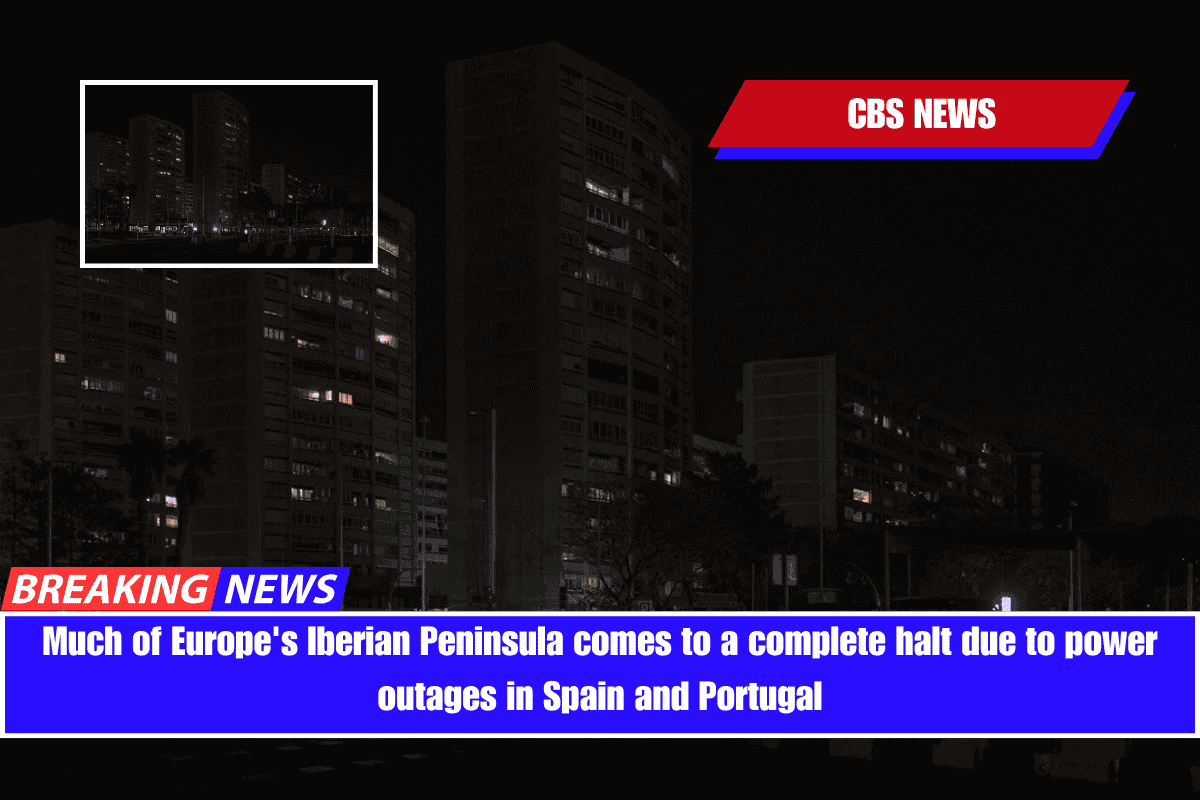On Monday, a massive, unprecedented power outage swept across much of Spain and Portugal. The blackout halted subway and railway trains, disrupted phone service, and shut down traffic lights and ATMs for millions of people living on Europe’s Iberian peninsula.
Red Eléctrica, the Spanish power distributor, finally announced early Tuesday morning that approximately 99% of the country’s power capacity had been restored. On Monday night, many city residents, including those in Spain’s capital, Madrid, went to bed in complete darkness.
The lights flickered again on Tuesday morning in Lisbon, Portugal’s capital. Portuguese Prime Minister Luis Montenegro earlier stated that he expected power to be restored by the end of the day on Monday.
Power outage hits Spain’s and Portugal’s capitals
On Monday, traffic lights in Madrid failed to function, causing offices to close and traffic to become congested. Many mobile phone networks did not allow calls, but some apps did. Residents in Barcelona searched stores for battery-powered radios, while civilians directed traffic at intersections along the city’s main thoroughfare, Gran Via.
According to Spain’s Prime Minister Pedro Sánchez, the outage was caused by a “strong oscillation” in the European grid, but the exact cause is still unknown. The Spanish leader urged the public to refrain from speculation and stated that no theories about the cause of the outage had been discarded.
According to Reuters, REN, the Portuguese grid operator, blamed the massive outage on a rare atmospheric phenomenon in Spain caused by extreme temperature variations. The Portuguese National Cybersecurity Center issued a statement saying there was no evidence that the outage was caused by a cyberattack.
Red Eléctrica declined to speculate on the cause of the blackout. Eduardo Prieto, Red Electrica’s head of operations, told journalists that the event was unprecedented, calling it “exceptional and extraordinary.”
Electricity was being drawn from Morocco and France to restore power to southern and northern Spain, Sanchez stated, thanking their governments. Spain was also increasing its production from hydroelectric and combined cycle thermal power plants.
Sánchez called an extraordinary meeting of Spain’s National Security Council and visited Red Eléctrica to monitor efforts to restore grid operations. Montenegro said he spoke with Sánchez several times. The Portuguese cabinet called an emergency meeting at the prime minister’s residence.
The two countries have a combined population of approximately 60 million people. It wasn’t immediately clear how many people were affected. It is unusual to experience such widespread outages across the Iberian Peninsula.
The outage did not affect Spain’s Canary Islands, Balearic Islands, or the African territories of Ceuta and Melilla.
The blackout is the second serious European power outage in less than six weeks, following a March 20 fire that shut down Heathrow Airport in the United Kingdom, and it comes as authorities across Europe prepare for Russian-backed sabotage.
A graph on Spain’s electricity network website showing demand across the country showed a sharp drop from around 12:15 p.m. to nearly 15,000 megawatts. By 7 a.m. local time on Tuesday, Red Eléctrica reported that the national grid was producing 21.265 megawatts, with 99.5% of capacity restored.
When the blackout struck on Monday, some people became trapped in elevators, garages, and subway tunnels. Authorities reported that nearly 300 rescue operations were carried out to free those trapped inside elevators in the Madrid region alone.
Spanish airports were forced to use backup electrical systems, and some flights were delayed, according to Aena, which operates 56 airports in Spain, including Madrid and Barcelona.
In Lisbon, terminals were closed, and throngs of tourists sat outside in the sun and shade, waiting for flight updates.
“We haven’t seen any planes arriving or departing in the 50 minutes we’ve been waiting here,” Dutch tourist Marc Brandsma told The Associated Press.
Train services in both countries came to a halt. Spanish television broadcast footage of people evacuating metro stations in Madrid and empty stations with trains stopped in Barcelona. Spain’s Transportation Minister Oscar Puente said on the social media platform X that trains would not be able to resume later Monday, even if power was restored.
The Madrid Open tennis tournament has been suspended. The power went out while three matches were in progress.
Spain’s traffic department has asked citizens to use their cars as little as possible due to a power outage that has affected traffic lights and electrical road signage.
Barcelona’s streets were crowded with people milling about in front of darkened stores and offices, exchanging information about what had occurred.
“We’re lucky. Some people became trapped in the metro. And there is a plus: we are communicating more with one another,” Monste Cortés said. She mentioned that dinner would be sliced bread and cold cuts.
Immediate concerns included determining which phone companies still had some spotty coverage and where internet access could be found. Another concern was how to get home with the subway closed and public buses overcrowded. Some people took advantage of the lack of connectivity and transportation to enjoy the sun on restaurant terraces.
Stores selling generators in Terrassa, an industrial town 30 miles from Barcelona, were sold out after people lined up to buy them.
According to Reuters, parts of France were briefly affected as well. RTE, the French grid operator, said it was working to provide power to parts of northern Spain.
The outage affected Lisbon and surrounding areas, as well as northern and southern Portugal, which has a population of approximately 10.6 million people. Portuguese police increased the number of officers on duty to direct traffic and respond to increased requests for assistance, including those from people trapped in elevators.
Hospitals and other emergency services in Spain and Portugal have switched to generators. Gas stations stopped working.
According to Portugal’s National Authority for Emergencies and Civil Protection, backup power systems are in operation.
Several Lisbon subway cars were reportedly evacuated. Courts in Portugal also ceased operations, as did ATMs and electronic payment systems.


















Leave a Reply